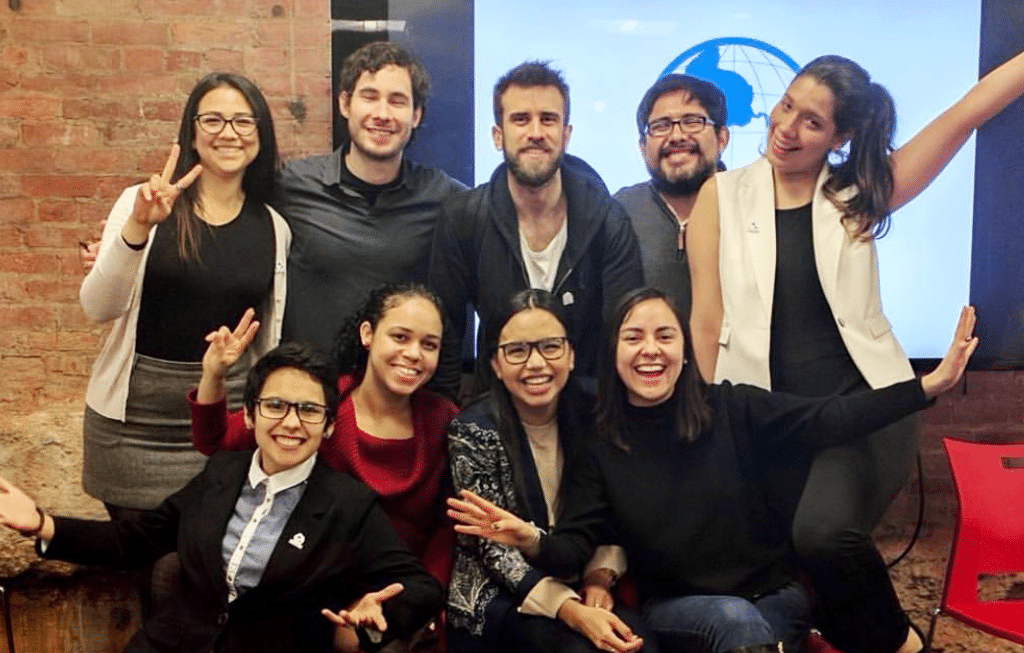
The Atlas Corps Fellowship was established in 2006 to help find solutions to social problems all over the world. The mission of the fellowship is to strengthen nonprofit organizations globally by investing in the leadership development of skilled social sector professionals aged 22 to 35. During the 12- to 18-month program, international Atlas Corps Fellows to the United States to serve full-time at host organizations, including nonprofits, private sector, and government agencies. They also learn best practices through the Atlas Corps Global Leadership Lab professional development series. After the program, fellows work in their home countries for a least one year in the nonprofit sector.
We spoke with current Atlas Corps Fellow Santiago Del Giudice of Argentina, who is based at the American Red Cross in Washington, D.C.
1. What inspired you to apply for the Atlas Corps Fellowship?
I started my journey in the social/development sector in early 2013 as an AIESEC volunteer at a primary school in rural Kenya.
After one and a half years working at a full-time job at an advertising agency and studying for my undergrad in communications at night, I reached a point where I felt I was going to explode. I found it pointless to spend my whole life in front of a computer working for someone who didn’t even pay me that much. It just didn’t make any sense for me. I thirsted to find out who I was, my purpose in life, and what I wanted to do for the rest of my existence. I was ready to jump out into the world and explore what was out there. I remember repeating to myself that I felt that I had too much energy to be wasted in front of a computer, so I wanted to go out there and use it for a good cause greater than myself.
Thus, after I finished my Bachelor of Arts in Communications, I quit my job and signed up for AIESEC’s volunteer program in Kenya. Why Kenya? I always had a passion for wildlife, limitless nature and freedom, and Kenya let me explore these passions. In addition, I was drawn to the fact that the project was located in a remote area of a country in such a controversial continent. Its association with poverty, hunger, and suffering made my young mind lean towards this project with the illusion of “changing the world”.
2. What are the benefits of the fellowship?
The main reason why I applied for this fellowship was that I saw it as an excellent opportunity to gain tangible skills and international exposure in a U.S.-based organization that hopefully will enhance my professional career in the future.
Professionally speaking, my fellowship couldn’t have been better. Working in the International Services Department at the American Red Cross gave me a lot of experience that I could have never gained in any other place. I managed a global program to provide the Red Cross/Red Crescent around the world with the latest technology that allows them to engage with local populations through First Aid and Multi Hazards mobile apps. I was the one responsible for engaging with the National Societies (including Canada, Ethiopia, Kenya, New Zealand, Sudan, France, among many others), providing them training, technical assistance, customer service, reporting, monitoring and evaluating services, and helping with dissemination. I even had the chance to present the program at regional events in Panama and Tunisia, which helped me gain international exposure and self-confidence.
3. What tips would you give others applying for the Atlas Corps Fellowship?
The application process is very straightforward. You first have to fill out some forms, and then the candidates have to go through a series of initial interviews with Atlas Corps staff members. Once you are in the final round, they match you with a host organization looking for someone like you and you have interviews with the host organization that you’ve been matched with.
I would recommend that you gain experience in the development sector so that your application stands out. The selection process is a very competitive one. Atlas Corps looks for mid-career level professionals with more 2 or more years of experience in the development/humanitarian sector and at least a Bachelor’s degree or equivalent. It doesn’t matter what is your background as long as the candidate has a minimum of 2 years working on a social/environmental issue. This could be LGBTQ rights, social innovation, religion or race relations, or any other field.
Santiago Del Giudice is from Buenos Aires, Argentina and earned a Bachelor of Arts in Communications from the Argentinian Catholic University and a Post Graduate Degree (similar to a master’s) in Social Innovation Management from The Amani Institute in Kenya. Before his fellowship, he had 6 years of working experience in profit, non-profit and public sectors in Argentina and Kenya. In the future, Santiago plans to pursue a career in Kenya’s development sector and continue his social enterprise with blind youth in Nairobi, called Drums in the Dark.
Interested in applying? Bookmark the Atlas Corps Fellowship to your ProFellow account.
© Victoria Johnson 2018, all rights reserved